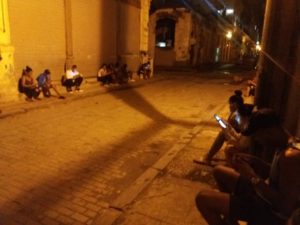
Fascinating to be back in the Cuban capital after 20 years. There are still a startling amount of dilapidated buildings along the Malecon; the same old American cars still just about holding together after 60 years of embargo (one taxi driver tells me how hard it is to get the parts); and a few hustlers saying cigars out of doorways – ‘tengo Cohiba!’
But change is slowly coming. Near the free Wi-Fi spots in the city – which are few and far between – you will see groups of Cubans huddled down in the street with the light from tablets, smartphones and laptops reflected back on their faces. Because the Internet has finally arrived.
In Santiago de Cuba – which I’ve also just re-visited – it only came last month; Havana has had it a little longer. But it’s a huge development and with it surely will come accelerated change, just as happened in Eastern Europe in the 1980s when they could view Western TV. The new president of Cuba, Miguel Díaz-Canel, has even issued his very first tweet – to mark the anniversary of independence from Spain back in the 19th century.
Next year sees the 500th anniversary of the foundation of the city that is one of the very oldest colonial creations in the Americas. There will be celebrations, but perhaps that will precipitate more.
There is much talk of the Chinese model – and the Chinese are heavy investors in Cuba at the moment – in which the one-party state retains power but the economy is allowed to grow in more capitalist directions. At the moment the state wage hovers around $30 a month. A private taxi driver can make that in a couple of days. Something has to give. Of course they get excellent health care and education for free, and as long as they are prepared to put up with all living in overcrowded family houses – ‘in Cuba you live and die with your parents’ even when you’re married,’ one young woman tells me, with all the stresses that can cause – free accommodation.
Hanging out with fishermen near Santiago, or in a family park in Cienfuegos, or with the new urban Internet users in Havana, I heard much the same message. But while they are very proud, often justly, of all the achievements of the revolution, and still feel a need to be judiciously quiet about its shortcomings (old habits die hard), change at the moment is only happening very slowly. Too slowly.
